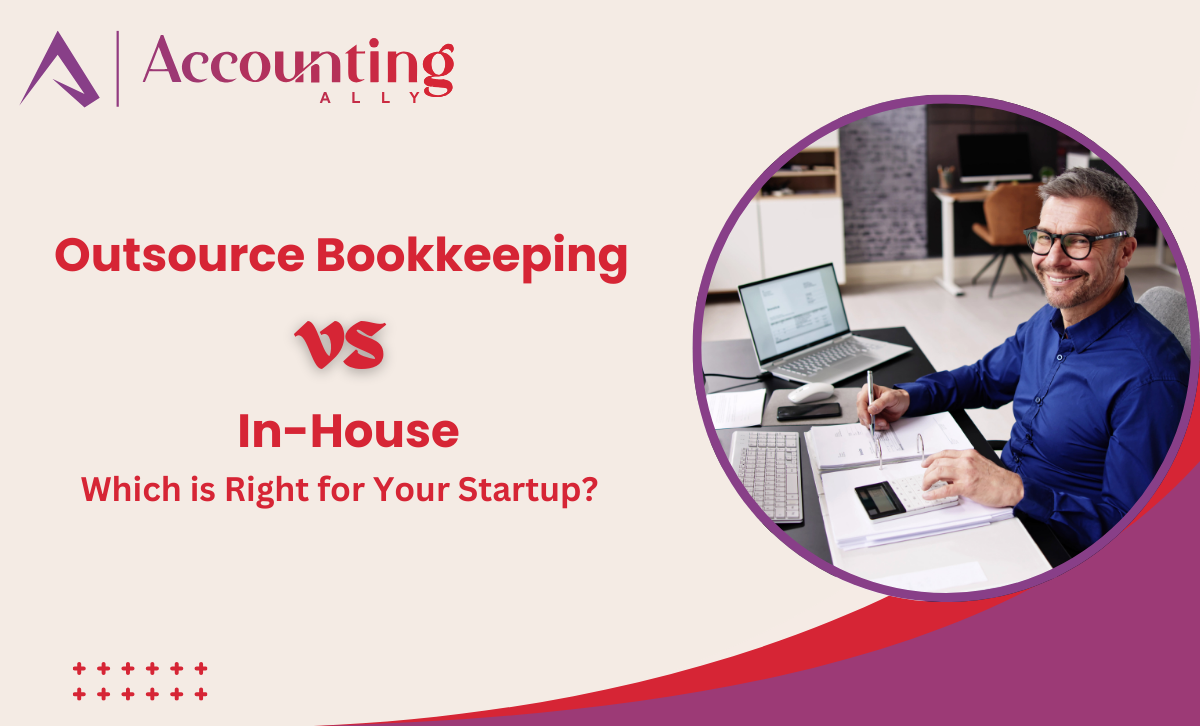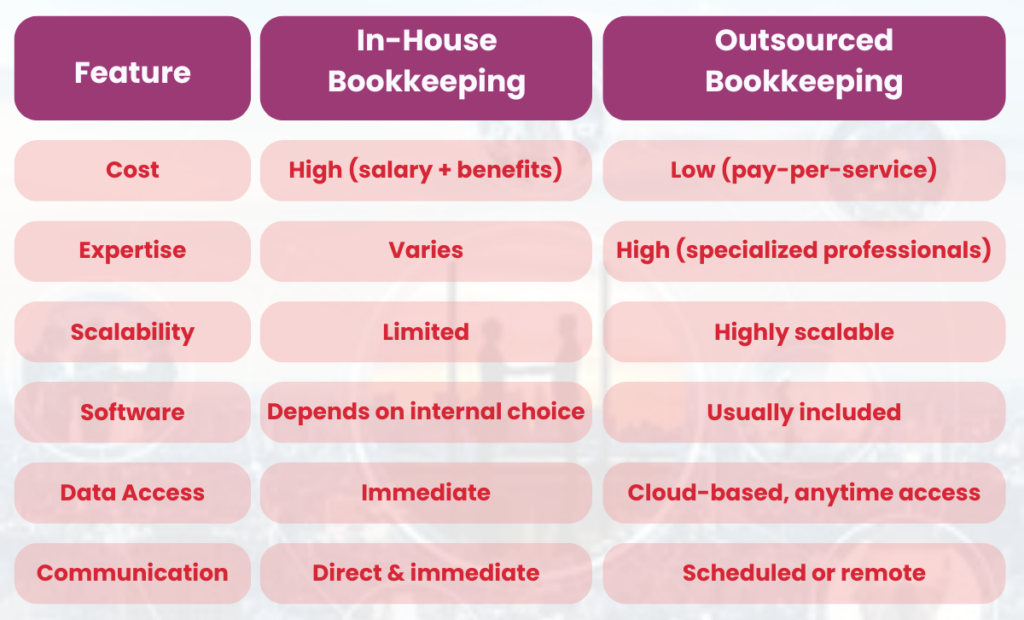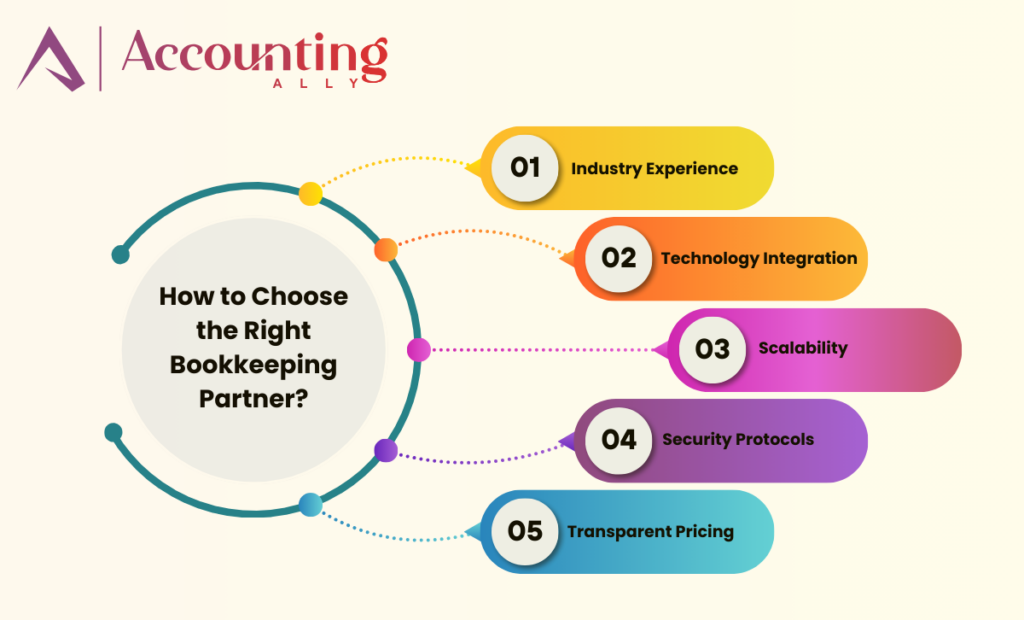Outsource Bookkeeping vs. In-House: Which is Right for Your Startup?

As a startup founder or small business owner, every decision you make plays a crucial role in shaping the future of your business. One of those critical decisions is choosing between in-house bookkeeping and outsourcing your bookkeeping tasks. Both approaches have their pros and cons, and the right choice depends on your business goals, budget, and growth trajectory.
Bookkeeping is not just about recording financial transactions. It lays the groundwork for financial reporting, compliance, investor readiness, and most importantly, business decision-making. So, let’s break down the differences between in-house and outsourced bookkeeping and help you determine which route is best for your startup.
What is In-House Bookkeeping?
In-house bookkeeping means hiring a full-time or part-time employee (or team) to manage your books within your company. This could be a dedicated bookkeeper, an accountant, or even you, the founder, during the early days.
Pros of In-House Bookkeeping:
- Control & Accessibility: You have direct access to your financial records and the person managing them.
- Immediate Communication: Real-time communication and collaboration are possible within your physical or virtual office.
- Company Familiarity: An in-house team often has a deeper understanding of your company’s operations, culture, and systems.
Cons of In-House Bookkeeping:
- Higher Costs: Hiring, training, benefits, and payroll costs make this an expensive option.
- Scalability Issues: As your business grows, your bookkeeping needs may outpace your in-house capacity.
- Risk of Errors: If the in-house bookkeeper is not up-to-date on regulatory changes or lacks experience, it could lead to costly mistakes.
What is Outsourced Bookkeeping?
Outsourced bookkeeping involves hiring an external provider or agency to manage your books. This model is becoming increasingly popular among startups and small businesses due to its flexibility and cost-effectiveness.
Pros of Outsourced Bookkeeping:
- Cost-Effective: You only pay for what you need—no salaries, benefits, or training expenses.
- Expertise & Accuracy: Access to experienced professionals with up-to-date knowledge of financial regulations and tools.
- Scalability: Easily scale your bookkeeping services up or down based on your business growth.
- Focus on Core Business: Outsourcing frees up your time to concentrate on business strategy and growth.
- Technology Driven: Outsourced partners often use the latest cloud-based accounting tools that offer real-time reporting and insights.
Cons of Outsourced Bookkeeping:
- Less Control: You may have limited direct oversight over day-to-day bookkeeping activities.
- Communication Delays: Time zone or availability differences can sometimes delay responses.
- Security Concerns: Sharing financial data with an external party requires trust and robust data protection.
Key Differences at a Glance

When Should a Startup Choose In-House Bookkeeping?
- You have complex financial operations that require close monitoring and real-time collaboration.
- You’ve raised significant capital and need a full-time CFO or finance team.
- You want tight control over financial processes and are ready to invest in long-term team development.
However, even in these scenarios, many startups begin with outsourcing and bring bookkeeping in-house once they hit a particular growth milestone.
When Should a Startup Choose Outsourced Bookkeeping?
- You are in the early or growth stages and need to conserve cash.
- You lack in-house financial expertise and don’t want to risk errors.
- You want to avoid the hassle of hiring and training bookkeeping staff.
- You need quick access to expert-level financial reporting for investors or lenders.
How to Choose the Right Bookkeeping Partner?
If you decide to outsource, here are a few tips to choose the right partner:
- Industry Experience: Choose a provider familiar with startup and small business finances.
- Technology Integration: Ensure they use tools that integrate well with your current tech stack.
- Scalability: Pick a provider who can grow with you.
- Security Protocols: Confirm their data protection measures.
- Transparent Pricing: Avoid hidden fees and opt for clear pricing models.
Accounting Ally: Your Outsourcing Partner for Scalable Bookkeeping At Accounting Ally, we specialize in providing outsourced bookkeeping services tailored for startups and growing businesses. From day-to-day bookkeeping to monthly financial reports, we help you keep your books clean, compliant, and investor-ready.
- Reduce costs by up to 50%
- Access real-time financial dashboards
- Scale services as your business grows
- Get expert support without hiring a full-time team
Learn more about our outsourced bookkeeping services here:
Conclusion
In the “Outsource Bookkeeping vs. In-House” debate, there is no one-size-fits-all answer. The decision depends on your startup’s current needs, financial health, and growth plans. While in-house bookkeeping offers control and immediacy, outsourcing provides flexibility, cost savings, and expert support—making it the preferred choice for many early-stage and growing startups.
If you’re looking to offload bookkeeping and focus on scaling your business, outsourcing is not just a smart move—it’s a strategic one.
Frequently Asked Questions (FAQs)
Is outsourcing bookkeeping safe for my business?
Yes, as long as you choose a reputable provider with strong data security protocols and confidentiality agreements.
How much can I save by outsourcing bookkeeping?
On average, startups can save up to 50% compared to the cost of hiring an in-house bookkeeper.
Can I switch from outsourced to in-house bookkeeping later?
Absolutely. Many startups begin by outsourcing and transition in-house as they grow and develop internal capacity.
What should I look for in an outsourced bookkeeping partner?
Look for experience with startups, use of cloud-based tools, scalability, transparent pricing, and strong communication practices.
Will I lose control over my finances if I outsource?
No. With modern cloud-based tools, you can access your financial data anytime and stay updated with regular reports and dashboards.
How do outsourced bookkeepers stay updated with tax and compliance laws? Professional outsourced bookkeeping firms continuously train their staff and stay current with changing regulations.
What bookkeeping tasks can be outsourced?
Everything from data entry, reconciliations, payroll processing, invoicing, expense tracking, to financial reporting can be outsourced.
1. Is outsourcing bookkeeping safe for my business?
Yes, as long as you choose a reputable provider with strong data security protocols and confidentiality agreements.
2. How much can I save by outsourcing bookkeeping?
On average, startups can save up to 50% compared to the cost of hiring an in-house bookkeeper.
3. Can I switch from outsourced to in-house bookkeeping later?
Absolutely. Many startups begin by outsourcing and transition in-house as they grow and develop internal capacity.


